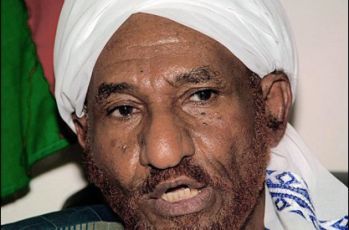Al-Mahdi blames South Sudan split on rulers’ failure to handle diversity
July 8, 2011 (JUBA) – Sudan’s former prime minister Al-Sadiq al-Mahdi has attributed the secession of South Sudan to the failure of the country’s rulers in managing its diversity, warning in the process against a new war between the two countries.

The vote was stipulated under the 2005 Comprehensive Peace Agreement (CPA) which ended more than two decades between the predominately Christian South and the Muslim-dominated North.
In a sermon he delivered following Friday prayers in South Sudan’s capital Juba, Al-Mahdi fulminated against the legitimacy of the rule of the National Congress Party (NCP) in North Sudan, saying that the secession of the South had further undermined the party’s credibility.
He further accused NCP’s leaders of peddling delusions about the beauty of Sudan’s map after secession, adding that the current map is “melancholic and indicative of detraction.”
Al-Mahdi, who had two spells in power as the country’s prime minister – and was ousted by a coup led by Sudan’s now president Omar Hassan Al-Bashir – acknowledged that the secession of South Sudan was a product of failure by the country’s rulers to manage diversity within unity.
The leader of the opposition National Umma Party (NUP) warned against what he termed as “the rise of racist and war-attracting rhetoric” by Northern and Southern leaders, accusing them of being unaware of the dangers of the new war.
Al-Mahdi called on the international community to participate in finding a solution to pending issues between North and South Sudan, in reference to disagreements over the borders and oil, warning that these issues could lead to war.
Separately, the NUP leader reiterated defense of his party’s decision to engage in dialogue with the NCP, saying they were negotiating with the NCP to prevent the disintegration of Sudan.
In a press conference held in Juba on Thursday, Al-Mahdi said that the dialogue between his party and the NCP had reached an advanced level.
However, he added that disagreements remain over essential issues “such as the International Criminal Court (ICC), Darfur and the national government.”
He further divulged that the dialogue was recently undermined by the issues of Abyei, South Kordofan and the Blue Nile as well as the NCP’s decision to deprive southerners from citizenship in the North.
“We have Americans and British citizens in the government itself, how come we deprive the country’s people’s in the South from citizenship,” Al-Mahdi said in reference to the fact that some senior NCP officials are holders of Western passports.
(ST)
